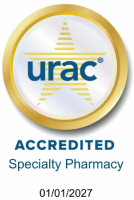People mistakenly believe fertility medications exist solely to treat female infertility. In fact, there are several medications used to treat male infertility, ranging from hormone therapy to male fertility injections that improve sperm morphology (physical structure) and motility (movement). These medications must be used with complete respect to the physician’s instructions to avoid adverse side effects.
Fertility pharmacies are a smart option if your male factor infertility diagnosis requires medicated treatments. The pharmacists and staff working for specialty pharmacies offer more in-depth and fertility-centric information and support. They are experienced in fertility therapy protocol and can answer questions and provide information about particular medication or fertility treatments in general.
The Most Common Medications for Treating Male Infertility Factors
The following are the most common medications used to treat male fertility factors, including information about usage and associated risk factors and side effects.
Clomiphene citrate (Clomid)
It may come as a surprise to learn that the same oral medication prescribed to women to promote ovulation is also prescribed to some men in order to improve sperm count.
Clomiphene citrate is an estrogen blocker. When men take it in oral form, it triggers the pituitary gland to make more luteinizing hormone (LH) and follicle stimulation hormone (FSH). A higher-level of these two hormones can improve sperm count, morphology and motility. Clomiphene citrate also increases higher levels of natural testosterone.
Note About Testosterone Supplementation: Many men mistakenly believe that testosterone therapy supports healthy sperm production and development. Quite the opposite is true. When you take supplemental testosterone, it can signal to your body that there’s plenty of testosterone in your system. This prevents the testes from producing more, healthy sperm. Always rely on a sperm analysis by a fertility specialist and adhere strictly to his/her recommendations when treating male infertility.
Potential side effects of clomiphene citrate:
- Irritability
- Mild acne
- Tender breast (pectoral) muscles
- The potential for accelerating prostate cancer growth if prostate cancer is already present (your doctor should screen you for prostate cancer prior to prescribing any male fertility medication)
- Changes in your field of vision (very rare)
These side effects stop and reverse as soon as you cease taking your medication. Call your pharmacist and/or your physician if you experience any of the above.
Positive side effects of clomiphene citrate
Most men experience positive side effects from taking clomiphene citrate, including enhanced sex drive, longer and harder erections, more energy, increased muscle mass and weight loss.
HCG and HMG
If you are one of the rare males who doesn’t respond to clomiphene citrate, your doctor will probably prescribe hCG or hMG injections. These have the same side effects (and benefits) listed above but are only prescribed when required since they are injectable medications, adding a level of complexity to their handling and administration.
Anastrazole (Arimidex)
Anastrazole was initially developed for women and men with breast cancers that are estrogen-sensitive (stimulated by estrogen). It prevents excess testosterone from converting into estradiol inside the body’s tissues. Anastrazole is typically used when a man’s estradiol levels are higher – and testosterone levels are lower – than they should be.
After correcting this initial hormone imbalance, anastrazole can improve sperm production, including sperm morphology and motility.
Side effects of anastrazole include:
- Stomach pain
- Joint/muscle pain
- Headache/nausea/diarrhea
- Throat infections
- Unusual tingling in hands/feet
- Swelling
- Bone breaks
Both these and other severe side effects are much less common in men using anastrazole as a fertility medication since its use is relatively short-term.
As with all medications, these male fertility meds can have contraindications when used with other medications and supplements. Always be 100% honest with your physician and your fertility pharmacists and let us know any prescription or street drugs, as well as supplements or steroid use, so we can safeguard your health, well-being and safety.
The pharmacists at Freedom Fertility Pharmacy have decades of experience working with men and fertility medications, facilitating healthy outcomes. In addition to providing medication- and diagnosis-specific information and education, we’re happy to answer any questions you may have. Contact us to learn more, or feel free to give us a call at 1-800-660-4283.



